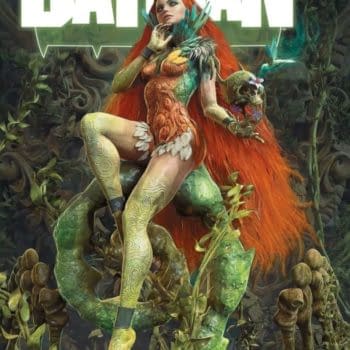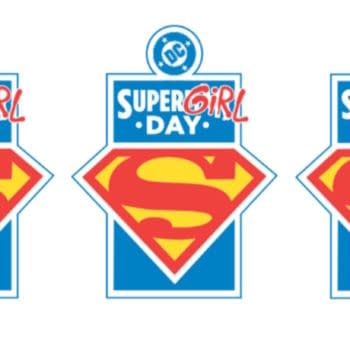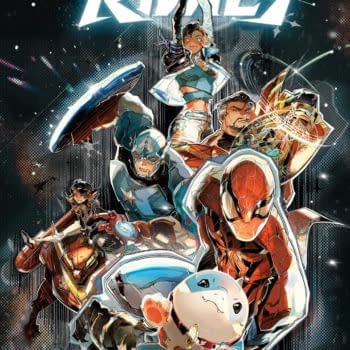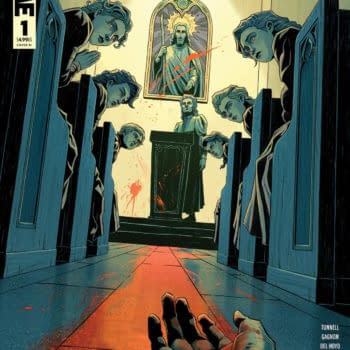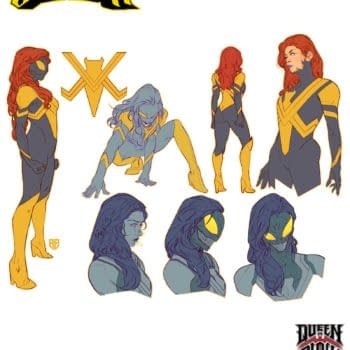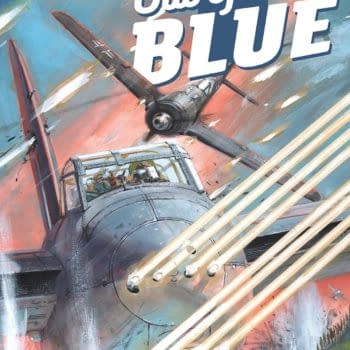Posted in: Comics | Tagged: Comics, Dynamite Entertainment, jennifer blood, Mike Carroll, rob williams
The Blood Is Getting Deep – Mike Carroll Talks Jennifer Blood
There has to be something daunting about stepping into a series created in part by Garth Ennis. As Mike Carroll brings the Blood Legacy story arc to it's climax, Rob Williams sat down to talk with the writer about the series, where it's been and where it's going.
ROB WILLIAMS: Who is Jennifer Blood for you? What distinguishes her from a character like, say, The Punisher?
MIKE CARROLL: Probably the primary difference between Jennifer Blood and most comic-book vigilantes is that Jen has a genuine character-arc! For the most part, the others don't change very much. Or if they do, something comes along pretty soon and hits the reset button.
With Jennifer Blood, her actions have consequences and those consequences don't just fade away. That's one of the elements I tried to highlight in the Blood Legacy arc: over four issues, we get to see how Jen's actions have had an effect on the world. The average comic-book vigilante will gun down a bunch of baddies, and a few issues later there'll be another bunch of baddies who don't seem to have learned anything from the massacre of the first bunch… There are few repercussions, no matter how drastic the vigilante's actions.
For me, Jennifer Blood has always – right from the start, with Garth Ennis's six-issue run – been about the fallout. Jen's father was murdered by his brothers, so she exacted revenge. When Al Ewing took over with issue #7, Jen had to deal with the consequences of her actions. I've attempted to carry on in that vein.
In issue #3, for example, Jen kills her uncle Nick. There's a single page where Nick – fearing that he's next on the hit-list – speeds away from his home in his expensive sports car… leaving his family behind without a second thought. Nick's wife and three children appear only in one panel, and they're not even given names. I'm sure that was deliberate on Garth's part: the story is told from Jen's point of view, and she's set on revenge, so she doesn't consider the wider consequences of killing Nick. In the second Blood Legacy story (Jennifer Blood #32, "Fresh Blood") I show the tale of Nick's daughter and how his death utterly destroyed the family.
RW: You've got an ultra-violent, murderous protagonist. I've written a few books like that and I know the trick is… how do you keep people rooting for your hero if they're not necessarily a hero?
MC: Presenting the story through the hero's own eyes is one way to achieve that! After all, one of the rules of story-telling is that every character is the hero of his or her own story. No one knows that they're evil: they can justify – to themselves, at least – every action, every decision, every judgment, regardless of how irrational or "evil" those decisions might seem to an outsider.
In Jen's case, her need for revenge was the force driving her forward in Garth's run, then with Al's run it was her desire to protect her family. By our standards, she does some absolutely reprehensible things, but to herself those actions make sense. Family comes first!
RW: When you took over the reins on the book from Al Ewing, what did you decide to do differently?
MC: Al totally painted me into a corner with the end of his run! By that stage in Jen's tale, the whole world knew who she was and what she'd done. Her long-cultivated sweet-little-housewife facade was gone forever… She could no longer hide. Not to mention that her kids had been taken into care and she'd never see them again. Plus she was in prison, dying on the ground from multiple stab-wounds… If she wasn't actually on death's door, then she was certainly trotting up death's driveway.
I don't know if Al had ever worked out a way continue the story from that point: I can easily picture him in his lair, cackling with glee as he rubbed his hands together, declaring, "I shall leave Jen in the worst situation possible and see if Mike can figure out how to save her! Bwahahahaaaa!"
Luckily, Al's evil plan backfired, because if he'd left Jen safe and sound it would have been much harder for me to come up with an exciting way to continue the story!
My first task was to get Jen back to health, and then – somehow – out of prison, but even then there was the stumbling block of everyone in the world knowing who she was, thanks to the trial. So I decided to turn that into an advantage. I had people on the outside with their own unsavory reasons for helping her escape. They not only get her out, but they offer her a way to get her kids back.
I guess the main difference between my approach and Al's is that his arc was primarily driven by Jen's desire to shield her children, while in mine she's pretty much lost everything. She's desperate and alone, and that makes her all the more dangerous.
RW: You've been writing Judge Dredd for 2000AD for some time now, but Jennifer Blood plainly offers you the chance to push certain boundaries. Is that something you enjoy, the freedom to go to more violent, blood-splattered areas?
MC: Hmm… Judge Dredd started out as a comic-strip for kids but he's grown up as the readers have, so we can tackle a lot of adult-themed stories. That means that, within reason, the three Bs are allowed: Blood, Boobs and Bad language.
But I also write young-adult novels (the Super Human / Quantum Prophecy series: tremendously good, action-packed superhero adventures that are unavailable in all really bad bookstores), and that area is very much a minefield of potential problems with an action-oriented tale.
I have to keep a very tight rein on the violence, references to sex must be oblique (and few in number), and there's no swearing allowed. In fact, the first three books of the series were first published in the UK, where these unofficial rules are a little looser. Consequently, I still occasionally receive e-mails from US-based readers (or, rather, their outraged parents) who are utterly shocked, disgusted and dismayed to discover that my teenaged characters use the word "Damn!" In fact, one e-mail even went so far as to accuse me of blasphemy, heresy and sacrilege because one of my characters says, "Oh my God!"
So with my first Jennifer Blood issues – the First Blood mini-series, now collected in a shiny new trade paperback! – I was like an excitable puppy who's been let off his leash for the first time. No holds barred – I could write anything I wanted! There are some particularly violent and nasty scenes in that series that I'd never be able to get away with in one of the YA novels (especially the one in issue #5, but I won't say what it is for fear of spoilers!).
RW: What can we look forward to in future Jennifer Blood issues?
MC: Well, sad to say there's only one more issue to go! Jennifer Blood #36 wraps up the Jen's story… for now! I feel it's a good ending: when I was asked to pitch ideas to follow on from Al's run, I had this ending in mind and though I'd love the title to run forever – and I have enough ideas for at least another couple of years' worth of issues – I'm very pleased with how it's turned out.
And, while I'm here, I'd be remiss not to mention my appreciation of the artists. Man, I really struck it lucky with those guys! First with Igor Vitorino on the First Blood series, then with Eman Casallos and Kewber Baal on the ongoing title. Without fail, and without complaint, they delivered more than the scripts deserved. I'd be more than happy to work with any of them again, if they'll let me!
Jennifer Blood #35 is on sale now.


















